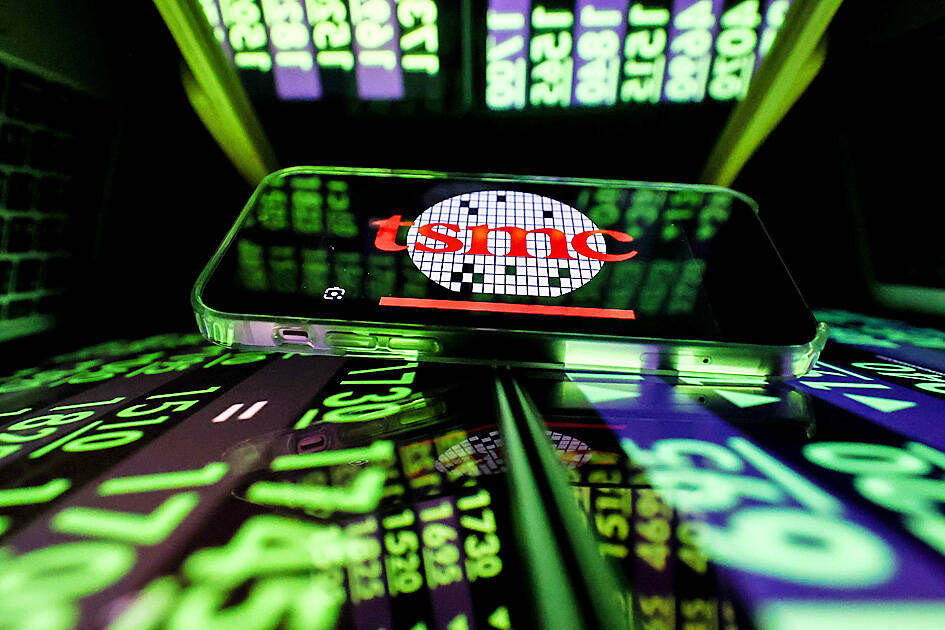Taiwan Semiconductor Manufacturing Co (TSMC, 台積電) yesterday said revenue for this quarter would be near the lower end of its guidance due to a magnitude 6.4 earthquake on the Richter scale that struck southern Taiwan last month.
The quake, which struck the southeastern part of Chaiyi County on Jan. 21, is estimated to cause TSMC losses of about NT$5.3 billion (US$161.4 million) in the first quarter, TSMC said in a statement.
However, the world’s largest contract chipmaker said its gross margin and operating margin forecasts in the quarter remain unchanged, as well as its full-year business outlook.

Photo: CNA
TSMC said the earthquake, along with several significant aftershocks throughout the Lunar New Year holiday, did not cause any structural damage to its fabs.
Water supply, power transmission, workplace safety systems and the company’s facility operations continue to function normally, it said.
However, a certain number of wafers in process were impacted and had to be scrapped due to the earthquake and aftershocks, TSMC said, without disclosing the exact numbers.
As the quake affected TSMC fabs at the Southern Taiwan Science Park (南部科學園區), which is a major site for producing advanced 3-nanometer and 5-nanometer process chips, the company experienced greater damage than the losses of NT$3 billion it incurred from the magnitude 7.2 earthquake on the Richter scale that struck in April last year.
TSMC yesterday said it expects revenue for the first quarter to be closer to the lower end of its US$25 billion to US$25.8 billion guidance made at an earnings conference on Jan. 16.
Its gross margin is forecast to stay unchanged at between 57 percent and 59 percent, and its operating margin remains between 46.5 percent and 48.5 percent, it said.
“The company is making every effort to recover the lost production, and there is no change to our full-year outlook,” TSMC said.
At last month’s earnings conference, TSMC projected revenue for this year to grow in the mid-20s compared with the year before, citing strong artificial intelligence (AI) and recovering non-AI demand, which would outpace the overall foundry industry’s 10 percent annual growth, it said.
TSMC’s remarks on the quake’s impact came as the company yesterday also reported that its consolidated revenue for last month reached NT$293.29 billion, an increase of 5.4 percent from the previous month and up 35.9 percent from a year earlier.
Last month’s revenue was the second-highest monthly sales in the company’s history, after the NT$314.24 billion it registered in October last year, TSMC data showed.
Shares in TSMC fell 1.78 percent in Taipei trading yesterday after its US depositary receipts fell 2.08 percent on Friday in New York, as the stock faces pressure from US President Donald Trump’s threats to slap tariffs on semiconductor imports.
The company is scheduled to hold a board meeting in Arizona this week, the first in TSMC’s 37-year history, and the market is speculating whether it would make any announcements to appease Trump.

Taiwan will prioritize the development of silicon photonics by taking advantage of its strength in the semiconductor industry to build another shield to protect the local economy, National Development Council (NDC) Minister Paul Liu (劉鏡清) said yesterday. Speaking at a meeting of the legislature’s Economics Committee, Liu said Taiwan already has the artificial intelligence (AI) industry as a shield, after the semiconductor industry, to safeguard the country, and is looking at new unique fields to build more economic shields. While Taiwan will further strengthen its existing shields, over the longer term, the country is determined to focus on such potential segments as

UNCERTAINTY: Innolux activated a stringent supply chain management mechanism, as it did during the COVID-19 pandemic, to ensure optimal inventory levels for customers Flat-panel display makers AUO Corp (友達) and Innolux Corp (群創) yesterday said that about 12 to 20 percent of their display business is at risk of potential US tariffs and that they would relocate production or shipment destinations to mitigate the levies’ effects. US tariffs would have a direct impact of US$200 million on AUO’s revenue, company chairman Paul Peng (彭雙浪) told reporters on the sidelines of the Touch Taiwan trade show in Taipei yesterday. That would make up about 12 percent of the company’s overall revenue. To cope with the tariff uncertainty, AUO plans to allocate its production to manufacturing facilities in

Chizuko Kimura has become the first female sushi chef in the world to win a Michelin star, fulfilling a promise she made to her dying husband to continue his legacy. The 54-year-old Japanese chef regained the Michelin star her late husband, Shunei Kimura, won three years ago for their Sushi Shunei restaurant in Paris. For Shunei Kimura, the star was a dream come true. However, the joy was short-lived. He died from cancer just three months later in June 2022. He was 65. The following year, the restaurant in the heart of Montmartre lost its star rating. Chizuko Kimura insisted that the new star is still down

While China’s leaders use their economic and political might to fight US President Donald Trump’s trade war “to the end,” its army of social media soldiers are embarking on a more humorous campaign online. Trump’s tariff blitz has seen Washington and Beijing impose eye-watering duties on imports from the other, fanning a standoff between the economic superpowers that has sparked global recession fears and sent markets into a tailspin. Trump says his policy is a response to years of being “ripped off” by other countries and aims to bring manufacturing to the US, forcing companies to employ US workers. However, China’s online warriors